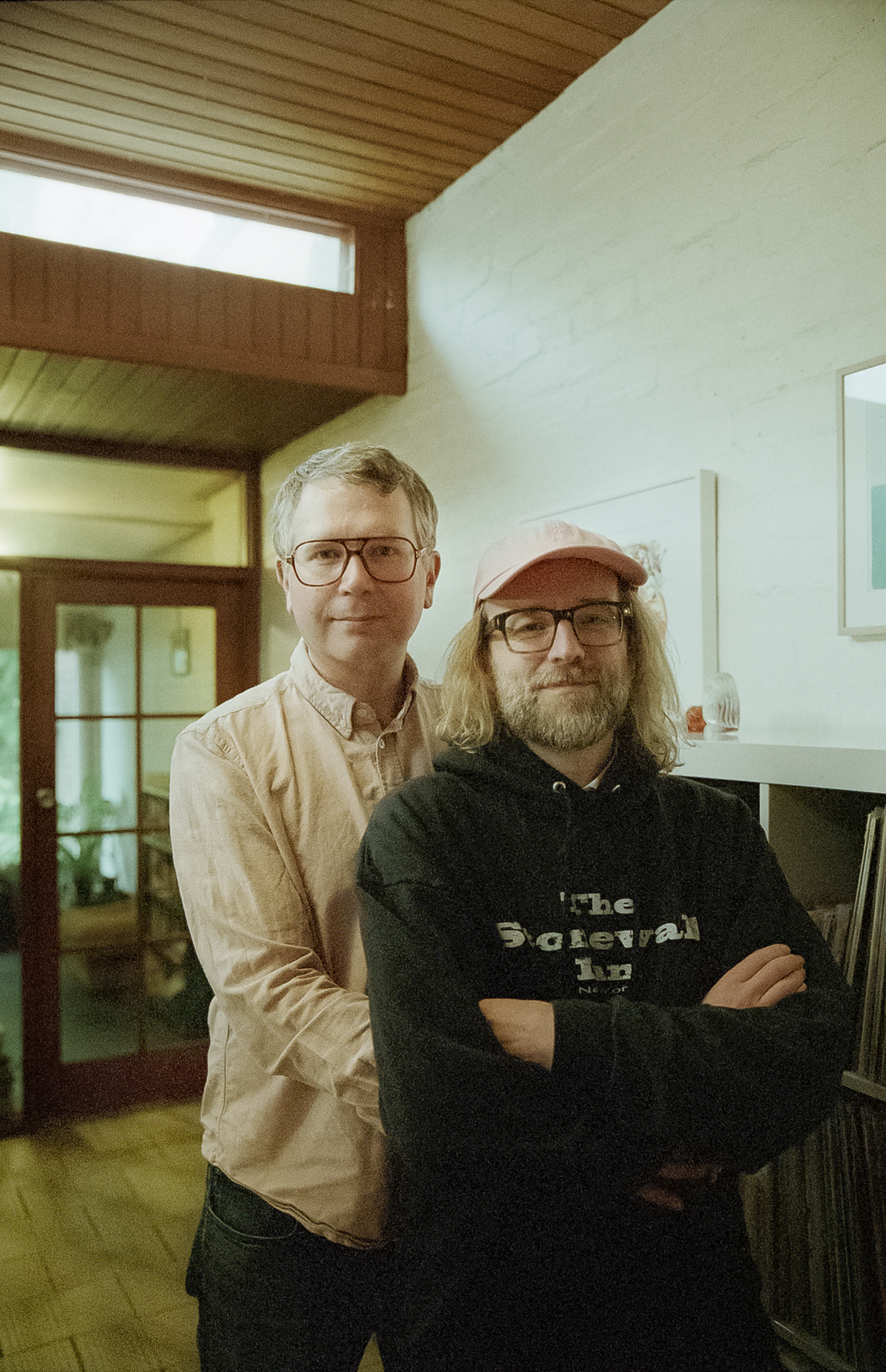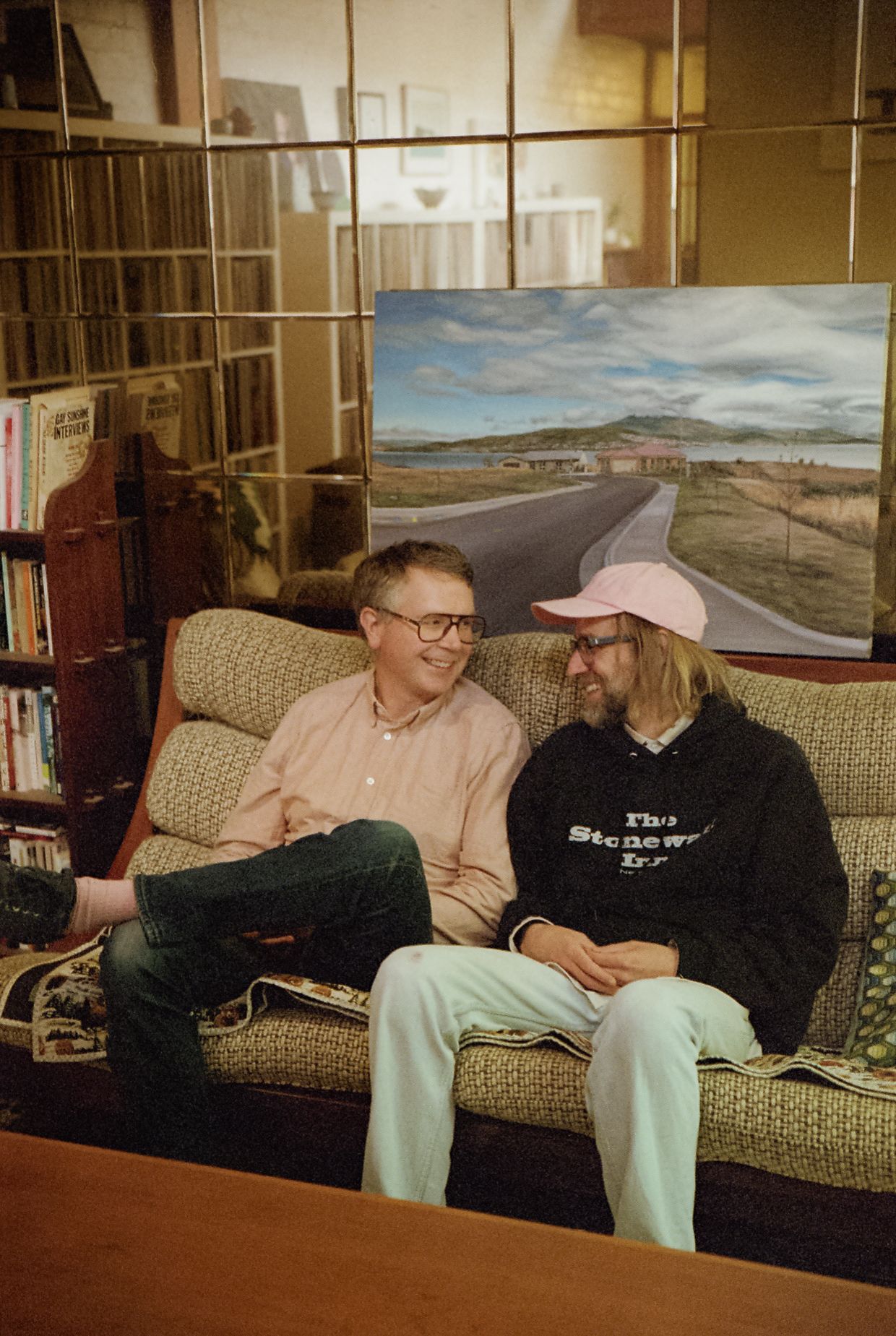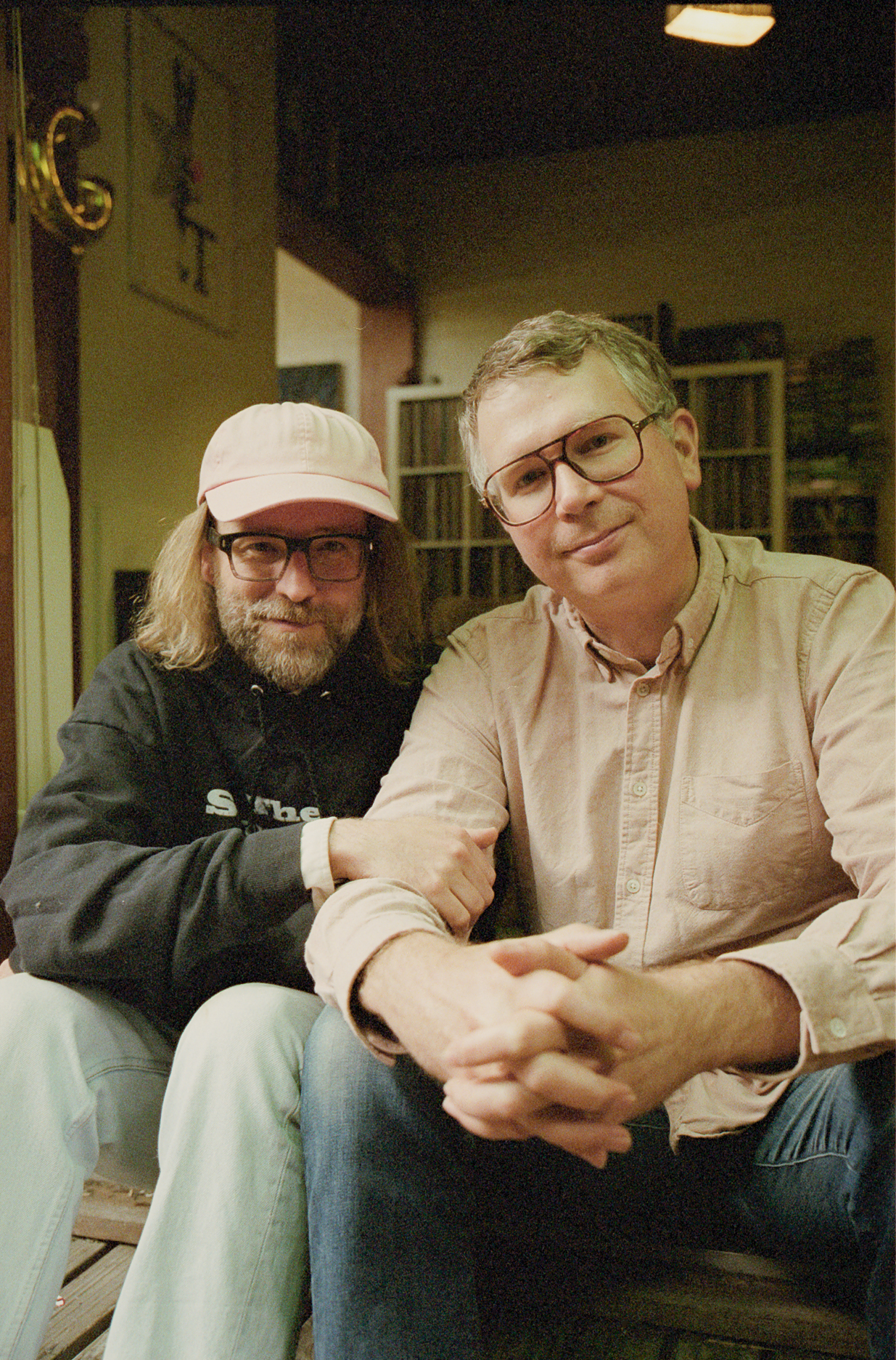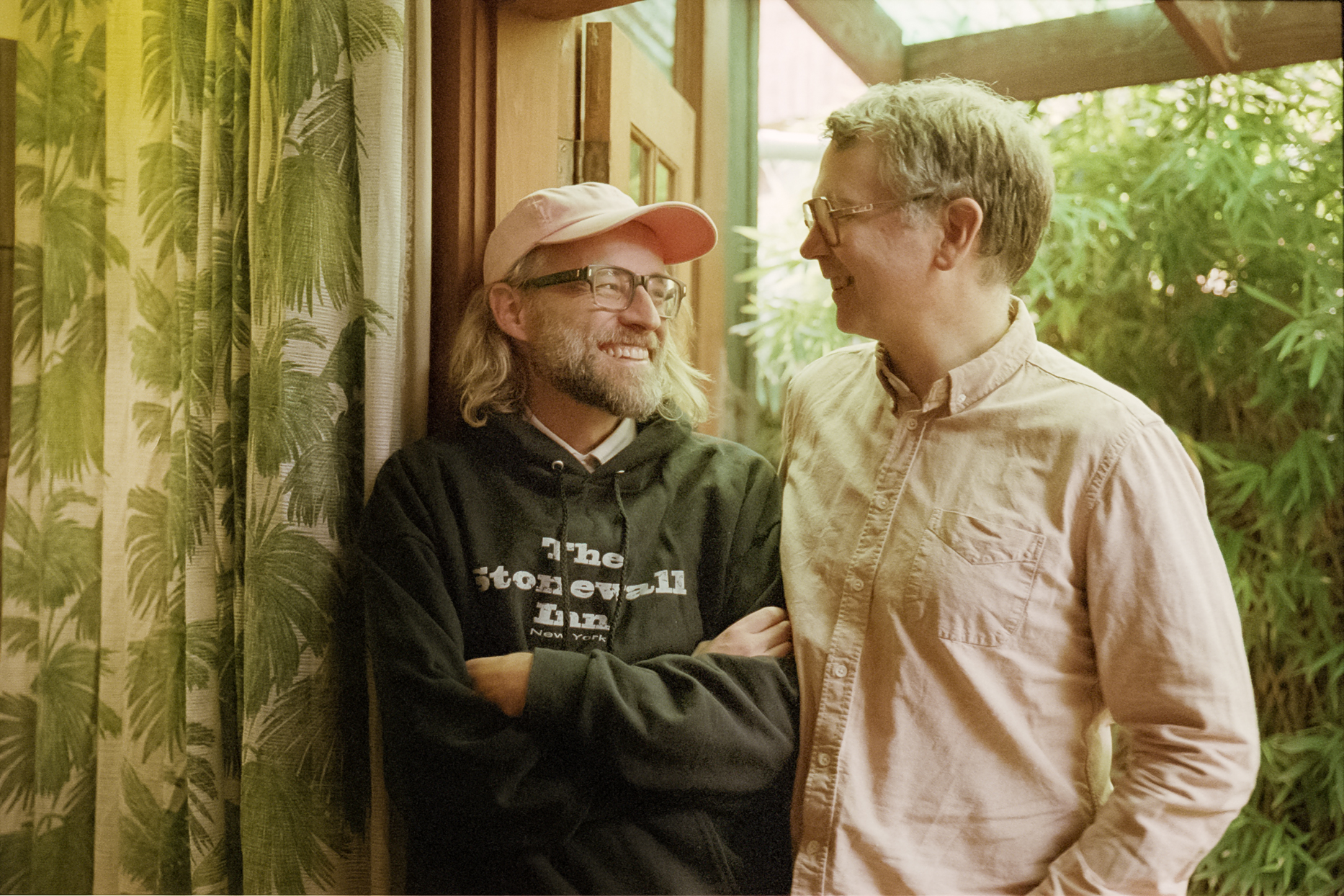“Making a label is creating the world you want to see,” Guy Blackman asserts. He’s sitting comfortably in his living room where a colourful array of records, large mirrors and objects of sentimental value hang proudly on the walls. There’s an old photo of him and his partner Ben O’Connor embracing, eyes full of love. There’s a drawing of the same photo, made by a friend. Everything in the plant-filled, sundrenched house exists in careful harmony, each corner is home to a shrine celebrating love and friendship. This space, Ben and Guy’s home, is also the office of Chapter Music, one of the longest running independent music labels in Australia.
Chapter’s first tape release was Bright Lights, Small City, a 1992 compilation of Guy’s favourite local bands from the Perth community he belonged to — it sold out the same night it launched. The label was one of the first in Australia to champion what today we could now broadly describe as indie. In the decades to come, Chapter Music would go on to work with bands like Dick Diver, Twerps and Beaches. For 25 years, Guy and Ben have been rejecting the type of alternative music that’s aggressive and overtly masculine in energy, instead shining a light on earnest bands that embrace softer emotions. To celebrate this year’s milestone, i-D sat down for a cup of peppermint tea with the couple running Australia’s most loveable label.
Triana: Chapter Music was born in 1992, a time when alternative music and DIY culture were becoming mainstream concepts. What elements of that era influenced you guys?
Guy: The early 90s were a time when bands like Nirvana, Sonic Youth and Pearl Jam were starting to get signed to big labels. That said, when Chapter started alternative music was still in some kind of opposition to mainstream music. I feel like these days you can’t say ‘indie’ without it having a sort of depoliticised connotation, but back then it was definitely a political thing. As a kid I thought that listening to alternative music meant that you really were a different kind of person than the people who listened to mainstream music. You belonged to an alternative community. That’s the way I viewed independent labels when I started Chapter.
Ben: I was in Melbourne and I didn’t know Guy during the first years of the label, but I was familiar with it. I remember that prior to Chapter I wasn’t even aware that there was an independent scene in Perth or Brisbane, so it was really exciting for me to discover independent music at a local level. I guess in a way, working with the local communities we belong to is how we’ve always done things. Even when we moved for a while to Japan, we put out Japanese bands, so Chapter has always been about the alternative community that’s directly around us.
T: What were some of the problems in the independent music community around the time you started?
B: The kind of independent music that was being heard at the time in Australia was something we were just not interested in. It was all of those kinda big, Australian, 90s, buy-in, alterna-rock bands. That seemed so alien to me.
G: I think back then community radio wasn’t going as deep into the local music scenes as it is now. Or maybe it’s just the announcers were a bit older back then, and they weren’t playing the kinds of bands that were around us at the time. Now it’s changed and they reach much further into local music communities.
T: So Chapter had that kinda against-the-oldies rebellious spark to it?
G: Oh, sure… but we were just brats too [laughs]. When you’re young you think anyone older than you either has an unfair advantage over you or is just old and boring. We thought labels around us that had any measure of success were “the establishment” and boring. We were just putting out cassettes and seven-inches and were so off the radar, but to us we were the centre of the universe and going to change everything. It felt so important.
B: The things that were being serviced to radio back then were from the “big” independents. Back then, I used to think of those things as being “corporate,” and not that different from major labels. I think that was part of my naiveté, because I was so young.

T: How do you feel about it now, 25 years later?
G: Now we’re the old guard [laughs]. We try as much as possible to keep engaged and absorb all sorts of new projects and ideas, but I’m sure to some people we’re old hat, set in our ways and boring.
B: Also, I think the landscape is really different now. There have always been good independent labels in Australia, but there have never been as many as there are now. There have also never been as many cities represented in music. Back then you would really only hear what was happening in Melbourne or Sydney.
T: Chapter Music represents a fairly diverse range of artists — acts like NO ZU, Twerps and Dick Diver, for example. What do you think is the common thread that unites all these artists under the label?
G: We want to hear someone saying something that no one else has said before. And we want to hear things that no one else could say but that artist. We’re really interested in honesty and that can take so many different forms. In any genre or any sound, we want to hear artists that are saying what’s really important to them, acts that have some kind of artistic need. We won’t put out something that we don’t quite like but might make us money. We have to be moved by something.
B: It’s all just based on our taste. We don’t put anything that the two of us don’t truly love and find ourselves really invested in.

T: I’ve also noticed that over the decades, you’ve not worked much with bands that have exclusively straight, white male members.
B: As a kid I found going to gigs really alienating, because on stage I would only see all these bro-y straight white dudes, so I was always looking for what else was out there. This is something that has always informed the way we run things. Chapter has only one all straight white male band on the label at the moment. For us, it’s always been important that we represent women, queer people and people of colour on our shows and records. We don’t always get that balance right, but we try and it’s essential to what we do.
G: Yeah, it’s definitely something that we think about a lot. I mean, we’re a queer couple, we just don’t identify with straight, male, hetero rock culture. We want to highlight other ways of making music and structuring communities. We’re just not very interested in the kind of music straight white dudes make.
T: I feel like beyond gender, Chapter puts forward the voices of musicians that are unafraid of being emotional or making music that feels softer, or sounds more pop.
G: Yeah, that’s a huge part of what resonates for us. Emotion and self-expression is so important, it’s what we look for. We want to see a beautiful, healthy, expressive music scene. It can be a bit stifled and repressed amongst straight white dudes — there’s so much noise being made but not much meaning to it. We want more meaning!
T: Finally, Chapter Music is about to turn 25! If it was a person, where would you take them out and what drink would you buy them for their birthday?
G: I would stay at home and give them a kombucha.
B: It would stay home, drink a kombucha and then I would take them to The Tote to drink weird white wine from a pot glass, and then we would go out to some sleazy gay bar and end up sniffing amyl.



credits
Text Triana Herdandez
Photography Tasha Tylee
